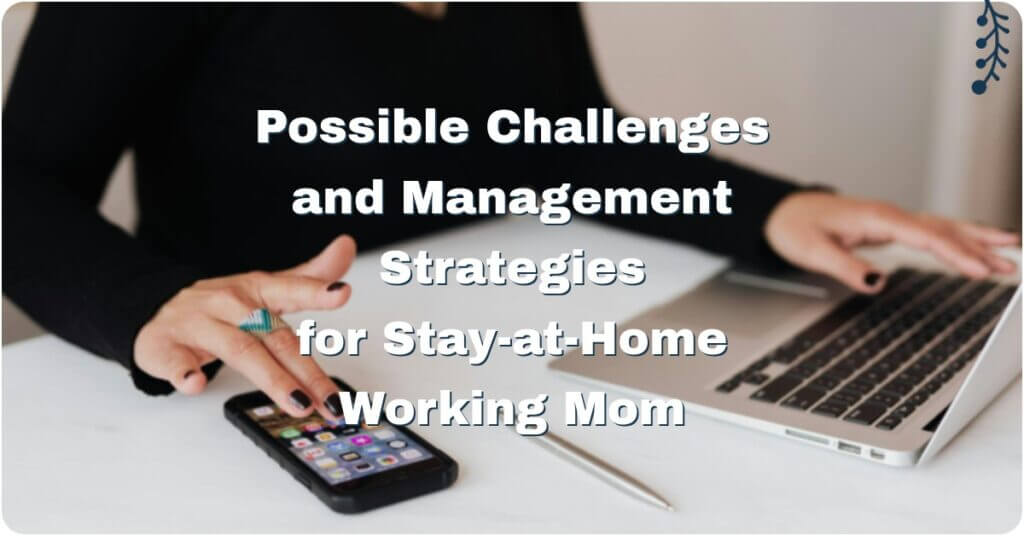Are you a stay-at-home mom considering work-from-home options, or a working mom looking into remote job opportunities to spend more time with your kids? It’s time to step into the new role: the work from home mom , balancing both childcare and professional responsibilities. Taking on both roles can be challenging, so it’s necessary to weigh several factors carefully before committing to this transformative decision.
Let’s discuss the main factors to consider and practical strategies to effectively manage this new role.
Key Factors to Consider as a Work from home mom :
1) What made you consider a work-from-home position?
The answer relies on your current situation:
- Facing a loss of identity or financial dependence as a stay-at-home mom?
- Dealing with financial imbalances at home?
- Feeling stuck due to mom guilt and considering work-from-home option?
- Adjusting to the early stages of bringing a baby into your life?
- Considering a work-from-home position due to high childcare costs?
- Returning to your career after taking a break?
- Opting to be present for your kids during their growing years?
Focusing on the answers to these questions can help you survive the transition phase and support your decision to be a stay-at-home working mom.
The job you choose should fit your needs. For example, if you’re considering becoming working from home mom options due to mom guilt, you might opt for a less time-demanding job. This way, you can spend more time with your child and better balance your work and family responsibilities.
2) What are your passions and/or areas of expertise?
When picking a job, make sure it aligns with your passion or area of expertise to prevent burnout in the long run. Working from home can be exhausting, managing household chores, parenting needs, and work pressures. Pursuing work aligned with your passion can greatly reduce stress and contribute to a mentally healthy lifestyle.
3) Are you looking for a part-time job or a full-time job?
This is something you have to sort out considering your lifestyle, the needs and ages of your kids, your health status, and the support you have. Of course, financial needs also play a role; if you need more income, you might have to increase your working hours. Take these factors into consideration before committing to the working from home mom role. Choose what is best for your mental health.
4) Do you have any strategies for managing the additional responsibilities?
It’s better to consider and plan in advance so that you don’t struggle with productivity in the initial days. Assess your workload and communicate with your partner about dividing responsibilities.
Consider where you will set up to work without any distractions. How do you plan to engage your kids during your work time? When will you schedule your household chores? What about meal planning—how will you manage it? After addressing these factors, is it possible to make time for your self-care? Tackle these and become a successful stay-at-home working mom.
5) Is it the right job for you?
As a work from home mom, you need to consider your home environment or make suitable adjustments before finalizing your job selection. Let’s discuss this with a few examples.
- Choosing a call center agent job: It can be challenging if you have a baby or toddler at home. Managing the noise from a crying baby or an overstimulated toddler can make it very difficult to continue your job effectively.
- As a content creator: With the growing demand for content creation as a part-time job, whether it’s freelance writing, video creation, blogging, or other forms, it’s important to be passionate about what you do. This work requires a lot of effort, time, energy, and creativity, so lacking passion can quickly lead to burnout.
- Jobs with a specific time frame: Roles like Data Entry Clerk often involve meeting deadlines for data input tasks. Similarly, online tutoring requires being present at scheduled times to teach students effectively. Therefore, you need to consider if it is feasible for you to work within a fixed time period, especially with the presence of children. If you prefer greater freedom in your working hours, seek out jobs that offer flexibility.
- Creative roles needing patience and concentration: If you are exploring business plans like baking, dye crafting, or web designing, these ventures require significant patience, focus, and a dedicated workspace. You might need a quiet, uninterrupted space away from children. These pursuits demand ongoing effort, sustained concentration, and patience to maintain productivity over time.
Prioritize what suits you best rather than following trends. Take time to explore and find what aligns with your goals. Understand your job and plan how to manage it effectively beforehand. Don’t stress; focus on discovering the path that fits your aspirations. You can always adjust your approach according to demand and circumstances.
Possible Challenges and Management Strategies of work from home mom :

1. Work-life balance struggles
Balancing work and family life, especially as a mother, can be challenging. Working from the comfort of home might seem ideal but often leads to distractions. This struggle can result in dissatisfaction in both roles, making you feel incomplete in your responsibilities as a mother and in your career, with increasing workloads on both sides.
Unlike an office, working from home has no set work hours, making it tough to manage your job, children’s demands, and household chores. Being home more often means dealing with additional household tasks and higher expectations from others. Children might demand more attention because they see you around, and your partner might expect you to take on more household responsibilities, assuming you have more time at home despite your work commitments.
Make a Schedule
- a) Make a List of Tasks: Start by listing all your daily or weekly tasks, including work assignments, household chores, family responsibilities, and self-care activities.
- b) Prioritize Tasks: Determine which tasks are most urgent or important. Rank them based on deadlines, importance, or the impact they have on your life.
- c) Set Aside Dedicated Time:
- Work: Allocate specific hours for focused work. Treat this time as if you were in an office, minimizing distractions.
- Household: Schedule blocks of time for chores and household management.
- Family: Plan quality time with your family, ensuring it’s a priority in your schedule.
- Self-Care: Include periods for relaxation, hobbies, or activities that recharge you.
- d) Create a Detailed Schedule: Use a planner or digital calendar to map out your day or week. Assign tasks to specific time slots, ensuring realistic expectations and allowing flexibility where needed.
- e) Review and Adjust Regularly: Reflect on your schedule periodically. Adjust timings or priorities based on changes in workload, family needs, or personal well-being.
2. Guilt
Mom guilt is real , whether you’re a stay-at-home mom, a working mom, or a work-from-home mom. Being with your kids yet feeling unable to meet all their needs can evoke feelings of guilt. Similarly, not being able to fully focus on your job on some days can also trigger feelings of inadequacy. It’s normal to experience these emotions.
Being at home full-time means children may expect us to play with them constantly, which isn’t always feasible. This can lead to them questioning why we’re not giving them our undivided attention or playing with them. In contrast, co-parents who return home from the office often have the chance to engage in uninterrupted playtime with the children. This contrast can add to our burden, as it’s challenging to provide constant attention to kids throughout the day.
As a working from home mom, guilt can stem from various aspects of life. There’s the feeling of not meeting expectations as a parent, not completing household tasks, having a messy home or meals not going as planned, and struggling to be productive in work or job-related tasks. Additionally, some may regret how they spend their time, feeling like they’ve wasted precious moments. These feelings of guilt can be overwhelming and difficult to manage while juggling multiple responsibilities.
Gratitude Journal
Practicing gratitude can be a powerful tool for managing mom guilt, especially for stay-at-home working moms. Starting a gratitude journal or simply reflecting on blessings can help combat feelings of overwhelm. It’s important to appreciate the joy of being present with your children as they grow while also maintaining your personal identity, which not everyone has the opportunity to do. For instance, you can be grateful for the experience of breastfeeding instead of breast pumping, witnessing your child’s milestones firsthand, and contributing financially to your family. By focusing on gratitude and counting your blessings, you may discover many more reasons to appreciate life, making a significant difference in your overall well-being.
Ensuring Quality Time
The flexibility of working hours can indeed be a blessing, but it’s essential to use it wisely. When working from home, there’s a tendency to constantly think about work, even while doing household chores, spending time with the family, or during supposed downtime. Without set working hours or a designated workspace, transitioning away from work can be challenging.
Similarly, allocate dedicated work hours where you can be highly productive without distractions. During these hours, avoid being preoccupied with your kids’ nap times, feeding schedules, meals, or household chores. Set aside quality time to be fully present with your family, free from work-related thoughts. This balance helps maintain efficiency in both work and family life while maximizing the benefits of flexible working hours.
3. Exhaustion
People often say that work-from-home moms are fortunate to have the opportunity to work without needing to leave home for an office. There is a misconception that they have an abundance of free time. However, only those who have experienced it firsthand understand the challenges of managing everything alone. Every individual is different, with varying capabilities, so managing these responsibilities requires a unique skill set.
One of the main challenges faced by staying at home and working is physical and emotional exhaustion. This is often exacerbated by the lack of free time, social connections, self-care, and lunch breaks. Unlike office-going individuals who have opportunities for social interactions and professional networking, and stay-at-home moms who may find occasional moments of respite, work-from-home moms often juggle both roles without the benefits of either. This dual responsibility can be uniquely challenging and demanding.
Sharing Responsibilities
Even if you feel like you are earning less compared to your partner, it’s important to feel confident and accomplished in your work. Divide parental responsibilities and household chores with your partner. Be open about your needs and communicate effectively. Depending on your job demands or working hours, don’t hesitate to seek outside help for household chores or childcare when needed. Communication and mutual support with your partner are key to managing these responsibilities effectively.
Self-Care
Me-Time: Even though you can work comfortably in your pajamas without needing to dress up daily for the office, try to dress up at least once or twice a week, even if it’s minimal. Make sure to comb your hair in the morning before starting work.
Allocate time for exercise and ‘me-time activities,’ as they’re necessary for your mental health and stress management. Schedule a self-care day. Make the best of it through Mindful Portrait.
Workspace: Create a dedicated work environment somewhere in your home. Divided attention is a common challenge for work-from-home moms, so having a focused workspace is essential. Working in a cluttered or messy house can seriously affect your productivity, so aim to keep your space organized and clutter-free. It’s okay not to be perfect, but clearing the clutter can significantly benefit your mental well-being.
Connect with Other Stay-at-Home Moms who are also working moms : Build genuine friendships and engage in social interactions. Take time to get out of the house for adult interactions. Be mindful of your screen time and social media use during your free moments. Add mindful moments into your daily routine to promote mental clarity and well-being.
Create an After-Work Routine for Yourself: An after-work routine can help you differentiate between your work and home time and stay on track. It can be a great way to unwind and recharge.
Reflections from Mindful Portrait

Even with the best schedules and plans, there will be days when things don’t go as expected. Kids may interrupt, fall sick, or you might feel drained. Accept these changes and adapt. Every child is unique, so being the primary caretaker while working may not be everyone’s cup of tea. However, that doesn’t determine your worth.
Many people are still searching for a job or a work-from-home opportunity. You are fortunate to have this option of becoming working from home mom, and your efforts will take time to flourish. Believe in yourself. Even if progress seems slow, you will eventually reach your goals. Set realistic targets, write them down, and stay motivated.

